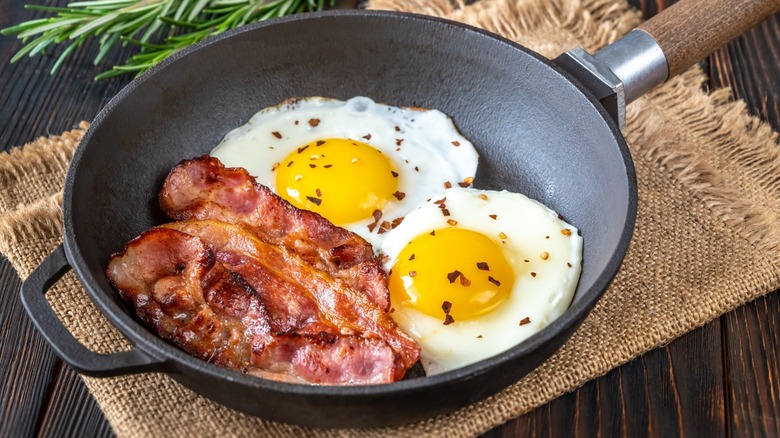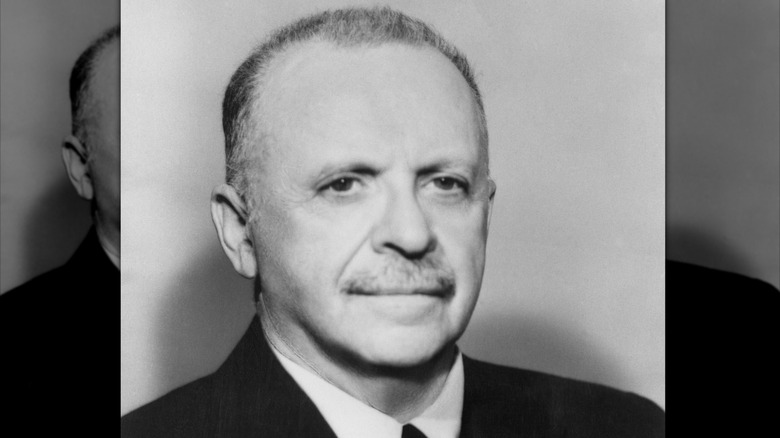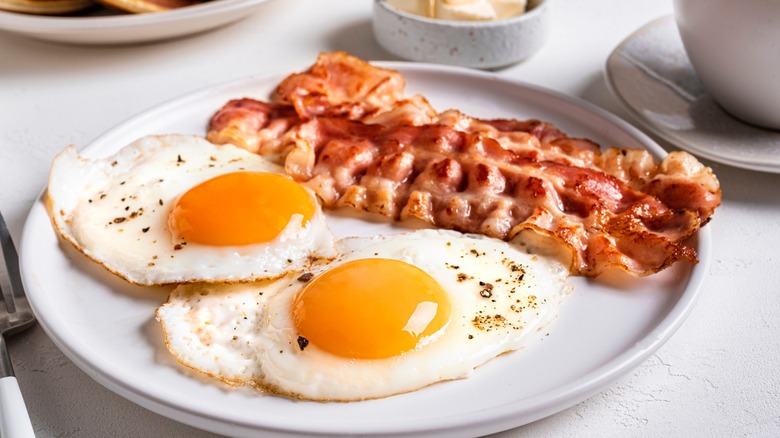How Bacon Became A Key Player In The Classic American Breakfast
Bacon. Bacon. Bacon! Just hearing the word can get the taste buds tingling, as the thought of sizzling aroma fills the mind. It transforms even the most unremarkable morning into a celebration through the promise of crispy, golden strips that are too tempting to resist. In the U.S., bacon has become a cultural phenomenon, with sales surpassing $4 billion annually and restaurant consumption soaring by 25%. On average, Americans eat nearly 18 pounds of bacon each year. With 70% of that bacon being consumed at breakfast, it's clear that bacon is the undisputed MVP of the American breakfast plate.
As Mark Twain said, "Nothing helps scenery like bacon and eggs." This iconic duo stands as unshakable in American food culture as the Statue of Liberty and so ubiquitous that you can find it in any American breakfast restaurant. But believe it or not, there was a time when bacon wasn't the star of breakfast. In fact, it wasn't until the 1920s that bacon took its rightful place on the morning plate, thanks to a cunningly orchestrated PR campaign by none other than Edward L. Bernays, the marketing mastermind who made bacon the breakfast hero it is today.
Bacon, WE WANT YOU for breakfast!
While curing pork belly dates back to 1500 B.C. in China, the version most familiar to Americans comes from the 16th century British tradition of curing pork with salt and herbs. Fast forward 500 years in America, with the shift from blue-collar to white-collar jobs, the demand for calorie-heavy, meaty breakfasts faded, and lighter options like cereal took over, leaving bacon on the sidelines. Now enter Edward L. Bernays, an Austrian immigrant who was later dubbed the "father of public relations," the man who forever changed bacon's fate.
In the early 1920s, the Beech-Nut Packing Company tasked Bernays with boosting bacon sales. As Sigmund Freud's nephew and a master of propaganda, Bernays knew that the way to the heart of breakfast wasn't first through the taste buds — it was through the mind. He understood that changing how people thought about bacon would make it irresistible long before they even took a bite.
He started with a simple survey. Bernays asked the doctor at his PR agency if a larger breakfast was healthier. After receiving confirmation, he had the doctor poll 5,000 fellow physicians, with 4,500 endorsing the idea of a heavier breakfast. Using this, Bernays launched a campaign with headlines like "4,500 Physicians Urge Heavy Breakfasts," specifically promoting bacon and eggs as the ideal morning meal. This manipulative tactic effectively revolutionized American breakfast culture. Together, with the help of flashy propaganda posters and magazine spreads, bacon quickly became the breakfast hero America didn't even know it needed. Practically overnight, bacon was sold! And it was being "recruited" by almost every American household that clamored for this fatty, crispy new breakfast favorite.
Bacon and Eggs: from breakfast staple to cultural icon
What's better than crispy bacon with a side of eggs cooked in it own flavorful grease? James Beard surely knew, if he had to pick a last meal, "it would be bacon and eggs". And honestly, you can't blame him. Whether you like your bacon extra crispy or your eggs perfectly runny, this dynamic duo has been a beloved American breakfast staple for decades. Starting in the 1990s, Bacon's presence in the food scene spread beyond breakfast, thanks to the fast-food industry's creative incorporation of it into their menus. This trend kicked off in 1992 with Hardee's Frisco Burger, which featured bacon as a star ingredient. After that, bacon and eggs weren't limited to mornings–it became an all-day staple. From "breakfast for dinner" to bacon-flavored snacks, candies, and even ice cream, the irresistible and versatile appeal of bacon transcended all the traditional meal times.
Bacon and eggs, this once-simple meal has evolved into a branded cultural icon that embodies the spirit of American commercialism and indulgence. Crispy, crunchy bacon? Yes, we want it, and in true American fashion, more is more. But do we really need it? That's a question Bernays, the PR genius behind bacon's rise, wouldn't be able to answer. His focus was on creating desire, and in that, he definitely succeeded.


